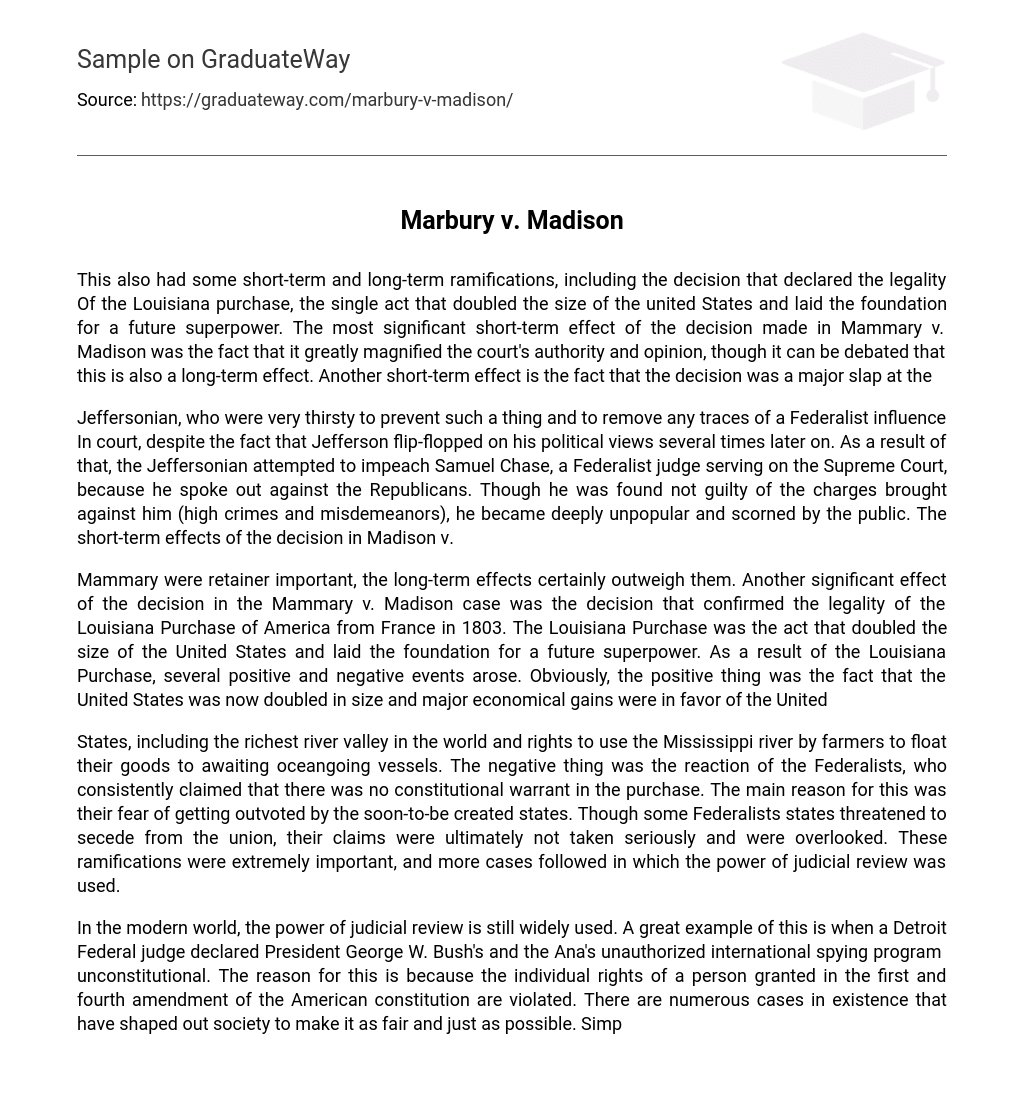The decision in Mammary v. Madison had significant consequences both in the short-term and long-term. It legally approved the Louisiana purchase, which effectively doubled the size of the United States and set the foundation for its future as a superpower. In terms of immediate impact, it greatly enhanced the authority and reputation of the court. However, one could argue that this influence extended beyond just the short-term. Furthermore, the decision dealt a major blow to a specific group.
The Jeffersonians were determined to minimize the Federalists’ influence in court, despite Jefferson’s shifting political views. Consequently, they made efforts to impeach Samuel Chase, a Supreme Court judge affiliated with the Federalists, due to his criticism of the Republicans. Although he was ultimately cleared of accusations of serious crimes and misdemeanors, he suffered from public disfavor and widespread unpopularity. The immediate ramifications of the decision in Madison v. were substantial.
Although the Mammary v. Madison case holds significance, its long-term impact outweighs its importance. A major consequence of this case was the confirmation of the legality of the Louisiana Purchase in 1803. This purchase proved to be a crucial action that resulted in doubling the size of the United States and establishing its foundation as a superpower for years to come. Consequently, both positive and negative events ensued following this acquisition, including substantial economic gains and expansion in size for the United States.
The acquisition of new states, including the wealthiest river valley globally and the rights for farmers to transport their products down the Mississippi river to reach ocean-bound ships, had its drawbacks. The Federalists reacted negatively, consistently arguing that the purchase lacked constitutional justification. This opposition stemmed from their apprehension of being outnumbered by the forthcoming states. Although a few Federalist states threatened secession from the union, their claims were ultimately dismissed and disregarded. The significance of these consequences cannot be overstated, as they led to subsequent instances involving the utilization of judicial review.
In the modern world, the power of judicial review continues to be extensively utilized. A notable instance of this is when a judge in Detroit Federal court deemed President George W. Bush’s and Ana’s unauthorized international spying program as unconstitutional. The rationale behind this decision is that it infringes upon the individual rights guaranteed by the first and fourth amendments of the American constitution. We have a multitude of such cases that have collectively molded our society to be as equitable and just as possible. In essence, each of these decisions holds significant importance as they have played a crucial role in shaping America into what it is today and will undoubtedly shape our future in an equally advantageous manner.
In the Mammary v. Madison case, Marshall inserted the keystone into the arch that supports the tremendous power of the Supreme Court in American life. This case was a milestone in American history as it granted the Supreme Court the significant power of judicial review, enabling it to make decisions that uphold individual rights and promote fairness and justice. Furthermore, the case also had both immediate and long-term consequences, such as the attempted impeachment of Samuel Chase and the decision permitting the Louisiana Purchase.
Thanks to judicial perspective, the United States has experienced numerous advantages. The country has witnessed a doubling of its land size, substantial economic progress, significant advancements as a modern society, and noteworthy political and legal achievements.





